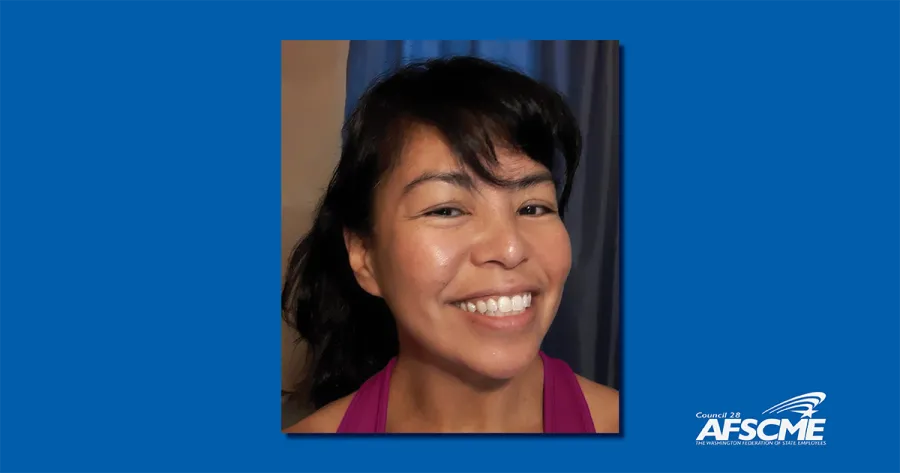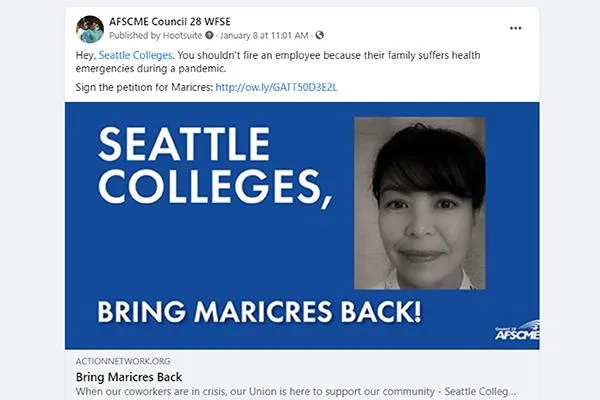Union Activism and Community Brought Maricres Back

Terminated by Seattle Colleges during the pandemic, Maricres was reinstated with the help of her union, member activists, friends and colleagues.
Maricres Tuliao has worked for Seattle Colleges in one form or another for 25 years. She started out as a student worker washing gym towels while she pursued an Associate of Arts degree.
From there she worked part-time in multiple departments and divisions—the cashier’s office, student registration, admissions—while she worked full-time as a private school instructor teaching dance and choreography for performances and competitions.
“I always kept one foot in the door at Seattle Central because of their mission in regard to diversity, equity, and inclusion,” Maricres said. “I believe in serving underrepresented communities and removing socioeconomic barriers when it comes to education. I saw how the college supported students and staff members and believed they would be there for me if I ever needed to lean on some good people.”
For the last seven years she worked full-time for the college, first as an administrative assistant and then at Seattle Central's Wood Technical School as a Program Specialist 2, where she helped maintain the school’s budgets and worked with local vendors to ensure the school was investing in the community and saving taxpayers money.
“My goal, my mission, is to serve students and the community.”
No matter what she was doing for the school, her approach was the same. “My goal, my mission, is to serve students and the community,” said Maricres. “Whoever came through the door, I did everything I could with my years of experience to ensure that they got the answers they needed to make them successful. That was my goal and still is my goal.”
Then, in the summer of 2020, in the middle of the COVID-19 pandemic, Maricres and her family experienced multiple life-threatening health crises, which led to Seattle Colleges claiming that she had abandoned her position.
“I had to step up and help my family,” Maricres said. “I had to take care of myself as well. It was challenging. I wanted to take care of my family member who was sick.” Maricres was unable to reach Seattle Colleges in time to let them know that she was not in fact abandoning her job.
Even though it was the first mark in Maricres’ decades-long relationship with the school and even though the college knew she was dealing with health crises, Seattle Colleges announced it had “moved on” and quickly filled her position.
“We filed it, made a proposal, and bargained.”
Having been a WFSE shop steward for three years at Seattle Central, Maricres knew the steps to take to file a grievance, but she was not able to while juggling family emergencies by herself. So Local 304 members and her WFSE Council Rep reached out.
“WFSE was concerned about my well-being as well as my family. Our union wanted to make sure I followed the proper procedures. The college has policies, of course, that protect the school, but we as union members have a collective bargaining agreement that protects us employees.”
So Maricres filed a grievance with the help of her council representative and shop stewards. “I told my story, told my situation, and I told the truth. We filed it, made a proposal, and bargained.”

In the meantime, WFSE circulated a petition to put pressure on the college to do the right thing.
Signatures flooded in from co-workers, friends, and WFSE members from across the state—from Bremerton, Chehalis, Kennewick, Sequim, and everywhere in between.
WFSE delivered the petition at the right time, and Seattle Colleges agreed to reinstate Maricres. On the very same day her grievance was resolved, she got the job she applied for at Seattle Central.
“I would like to give a big shout out to everyone who signed the petition,” says Maricres.
“If I could, I would give you all a hug! This is what our union, and we together as a community, are all about. We pool our resources and help each other when we are in need. Thank you. I also want to say, thank you Dr. Sheila Edwards Lange and HR.”
